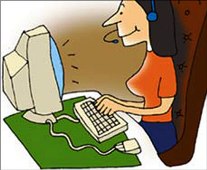 Regarded as a progressive state with total literacy and social sector indices matching even advanced countries and a high gender equality index, Kerala still lags behind most other Indian states in work participation of women.
Regarded as a progressive state with total literacy and social sector indices matching even advanced countries and a high gender equality index, Kerala still lags behind most other Indian states in work participation of women.
The state's female employment rate of 22.9 per cent sharply contradicts its hyped records in gender empowerment, according to the 'Economic Review 2009,' released by the state planning board recently.
In contrast to 55.9 per cent of rural males and 54.7 per cent urban males employed in Kerala in 2004-05, work participation rate of rural and urban female counterparts were only 25.6 per cent and 20.0 per cent in the same period, it said.
Leaders of women rights movements cite many reasons for the situation like failure of girls to receive professional and skill based education and the approach of society, which tend to see women as just housewives.
Communist Party of India-Marxist leader T N Seema, the first woman to be elected to the Rajya Sabha from Kerala, feels the conventional education system contributes a lot to low working participation of women.
She said the education system in Kerala is still degree oriented.
After 10th standard, around 90 per cent of girls and boys pursue plus two and then courses like BA or BSc.
They opt for service sector jobs in government or private firms, which together offer only limited job opportunities, leaving a large number of educated outside the scope of secured jobs.
"Unfortunately, victims of this trend are mostly women. Parents send girls to schools and colleges, prompt them to write government job tests and if they fail to gain employment, get them married off. A large section of educated women are thus destined to remain unemployed throughout their lives," Seema said.
The Review blames the type of education women receive as the main reason for unemployment.
Women are found to be over represented in general education, which would not impart specialised job skills or make them professionally qualified.
While 16 per cent men opt for non-technical education, only 7 per cent women prefer technical education.
Seema, also a member of the state Gender Board, says Kerala girls are not properly guided by parents or teachers, as a result of which the states educational achievements fail to get translated into employment for women.
Though Kerala women do not lag in receiving higher education, rapid growth in professional institutions in private sector has contributed to rise in 'educated unemployment' over the years.
According to Ajitha, a womens rights campaigner and former Naxalite, the societal set up and its family-oriented attitude is the biggest hurdle for women in Kerala.
"The low work participation of women in Kerala is something natural, considering the social system. Women who choose to confine themselves within the four walls of their home are respected here.
"Anybody insisting on going out for jobs or education is treated as a burden by the male-dominated family set up.At the same time, if the family wants women to earn money, they are sent for jobs," she said.
Ajitha said, "There are a large number of women who turn down promotions and foreign fellowships under pressure from families. I know of engineering graduates and post-graduates who just live as housewives."
Official figures state that the striking aspect of female employment in Kerala is their low proportion in agriculture and rural jobs.
At the same time, their proportion in the secondary sector is slightly higher. But the service sector accounted for almost 25 per cent of total women employed in rural areas and 56 per cent in urban area.
Analysts say the trend indicates a structural transformation of economic activities of women in Kerala with primary sector losing its importance and tertiary sector gaining significance.
Seema feels there are signs of an improvement, though they might not have begun to reflect in official reckonings.
A large section of women now earn money through self employment and self-help initiatives.
There are hundreds who earn a living by working in shops, hospitality industry, hotels and self-help groups like Kudumbasree.
"Their wages maybe less compared to those employed in the state services, but still they are employed. When official data is compiled, these women should also be factored in," she said.








 © 2025
© 2025